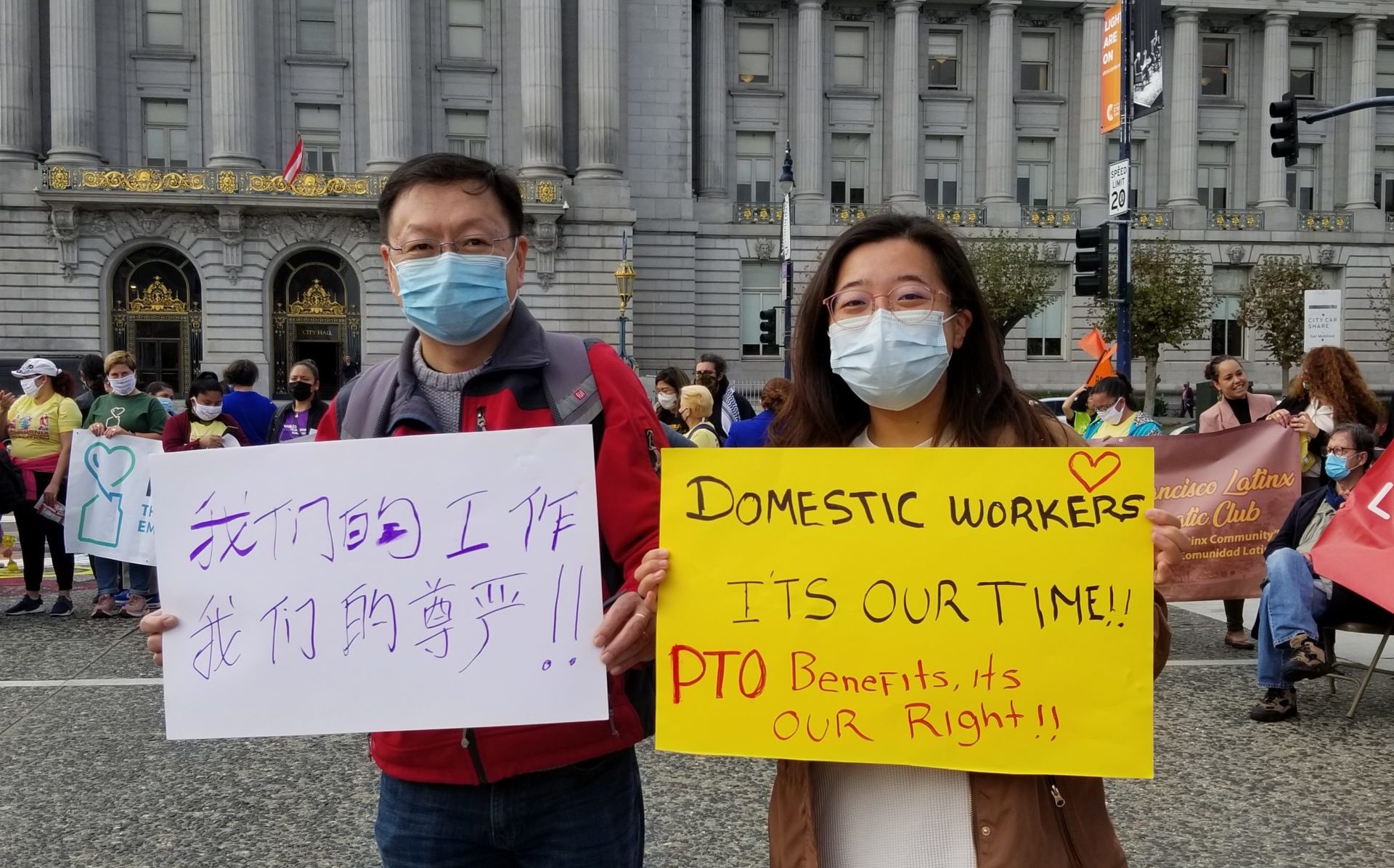
Looking back on 2021, we’re grateful for how much we have achieved together. From the passage of important legislation protecting domestic workers and protecting language education — to the coming together of our friends, allies, and neighboring communities, we ended 2021 with hope in our hearts.
Read on to learn how we spent the last few weeks of 2021 at CAA.
Board of Supervisors approves paid-time-off benefits for domestic workers
CAA joined the successful campaign to bring paid-time-off benefits for San Francisco’s 10,000+ domestic workers.
We did it! After months of advocacy, the Board of Supervisors passed a landmark bill granting paid-time-off benefits for house cleaners, nannies, and other domestic workers in San Francisco. In a part of the workforce with large numbers of women, immigrants, and non-English speakers, this measure represents a big step forward in defending the rights of vulnerable workers.
When it goes into effect, it will bring newfound financial freedom to over 10,000 domestic workers, who can now take sick leave, vacation days, and other paid-time-off benefits.
Following the lead of organizations like the California Domestic Workers Coalition, CAA’s economic justice team supported this bill throughout its months-long passage, attending rallies and sharing materials with our extended community. You can learn more about the ordinance here.
CAA reports on the state of language access in San Francisco
Co-authored by the Language Access Network of San Francisco (LANSF), of which CAA is a founding member, the report evaluates the efficacy of the Language Access Ordinance.
Since 2009, the Language Access Ordinance has asserted the rights of limited English proficient (LEP) individuals to request public services in the language of their choice. But how well has this ordinance functioned? CAA joined forces with LANSF to determine whether the ordinance is meeting the ever-changing needs of San Francisco’s LEP communities.
Drawing from a combination of compliance data, spot checks, and community interviews, the resulting assessment, “Speaking From Experience,” came to the conclusion that while San Francisco has made consistent progress in enforcing language access, more action is needed.
The report recommends that City agencies strengthen enforcement strategies, increase community engagement, and expand service provisions for speakers of Arabic and Vietnamese. For more on our key findings, read our blog post here.
The winter solstice brings communities together
Despite the pandemic, the end of the year brought a host of virtual celebrations and community events, giving CAA the chance to celebrate with our friends and neighbors.
In December, CAA brought community members together to celebrate the winter solstice. Although the pandemic prevented us from gathering in person, hundreds of people joined CAA for a festive afternoon featuring interactive games and live performances including dance routines, piano recitals, and traditional songs. The CAA program team also updated attendees in Cantonese about our activities across community safety, education equity, and immigrant rights.
The Winter Solstice Festival followed several other community events, including International Migrants Day. Co-organized by the San Francisco Immigrant Legal & Education Network (SFILEN), of which CAA is a co-founding member, the event attracted more than 200 attendees to reflect on the theme, “Our Solidarity Crosses Borders.”
To learn more about both celebrations, you can read our latest blog post.
CAA rallies to save City College Cantonese program
CCSF trustees passed a resolution to develop a degree and certificate program for Cantonese, potentially saving it from budget cuts.
Over the years, whenever City College of San Francisco (CCSF) faced budget cuts, Cantonese classes were put on the chopping block because the college prioritized certificate and degree programs. This resolution will create a Cantonese certificate program and provide transfer credits to four-year institutions like the University of California, shielding Cantonese classes from future budget cuts.
As a long-time advocate for education justice and language access, CAA was one of the first to announce support for this resolution. “City College is a hub for free and affordable adult education,” said CAA education equity program manager Sally Chen, at a recent board hearing. In addition to preserving the language, history, and culture of San Francisco’s Chinese communities, she asserted, “this program is critical for community workers and language interpreters serving limited-English proficient individuals, and this proposal is critical in saving it.”
Now that the resolution has passed with the unanimous support of the trustees, it will head to the chancellor for implementation.



